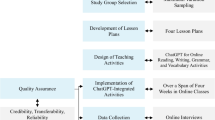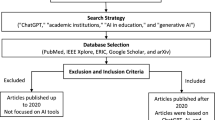Abstract
ChatGPT, a promising chatbot program based on generative artificial intelligence (GAI), shows significant promise for its potential use in English as a Foreign Language (EFL) education. By engaging in dialogue with students, it provides personalized support for their reading and writing, which are fundamental aspects of EFL instruction. Although research on students’ interaction with ChatGPT is emerging, there is a lack of focus on their Processing Tactic towards ChatGPT’s Feedback (PTCF) and its impact on learning outcomes. To mitigate this gap, we employed a learning analytic method combining cluster analysis and process mining to analyze multimodal data generated during their reading and writing tasks. The analysis identified three clusters of students’ PTCF: (1) Silence with no response, (2) Passive dependence, and (3) Active construction. By conducting sequence analysis on these behavior patterns, it was found that learners adopted three learning modes when using ChatGPT, which are Comprehension-focused, Tool-inspired, and Thinking-alienator. The findings also revealed differences in learning gains among groups of students with varying learning modes, specifically in the improvement of domain knowledge. Implications of these findings for both practical application and future research were also discussed later.
Access this chapter
Tax calculation will be finalised at checkout
Purchases are for personal use only
Similar content being viewed by others
References
Keh, C.L.: Feedback in the writing process: a model and methods for implementation. ELT J. 44(4), 294–304 (1990)
Javaid, M., Haleem, A., Singh, R.P., Khan, S., Khan, I.H.: Unlocking the opportunities through ChatGPT tool towards ameliorating the education system. BenchCouncil Trans. Benchmarks Stand. Eval. 3(2), 100115 (2023)
Oravec, J.A.: Artificial intelligence implications for academic cheating: expanding the dimensions of responsible human-AI collaboration with ChatGPT. J. Interact. Learn. Res. 34(2), 213–237 (2023)
Cotton, D.R., Cotton, P.A., Shipway, J.R.: Chatting and cheating: ensuring academic integrity in the era of ChatGPT. Innovations in Education and Teaching International (ahead-of-print) 1–12 (2023)
Praphan, P.W., Praphan, K.: AI technologies in the ESL/EFL writing classroom: the villain or the champion? J. Second. Lang. Writ. 62, 101072 (2023)
Zuckerman, M., et al.: ChatGPT for assessment writing. Med. Teach. 45(11), 1224–1227 (2023)
Gayed, J.M., Carlon, M.K.J., Oriola, A.M., Cross, J.S.: Exploring an AI-based writing assistant’s impact on English language learners. Comput. Educ. Artif. Intell. 3, 100055 (2022)
Tlili, A., et al.: What if the devil is my guardian angel: ChatGPT as a case study of using chatbots in education. Smart Learn. Environ. 10(1), 15 (2023)
Adeshola, I., Adepoju, A.P.: The opportunities and challenges of ChatGPT in education. Interactive Learn. Environ. 1–14 (2023). https://doi.org/10.1080/10494820.2023.2253858
Nisar, S., Aslam, M.S.: Is ChatGPT a good tool for T&CM students in studying pharmacology? Available at SSRN 4324310 (2023)
Baidoo-Anu, D., Ansah, L.O.: Education in the era of generative artificial intelligence (AI): understanding the potential benefits of ChatGPT in promoting teaching and learning. J. AI 7(1), 52–62 (2023)
Song, C., Song, Y.: Enhancing academic writing skills and motivation: assessing the efficacy of ChatGPT in AI-assisted language learning for EFL students. Front. Psychol. 14, 1260843 (2023)
Kiryakova, G., Angelova, N.: ChatGPT—a challenging tool for the university professors in their teaching practice. Educ. Sci. 13(10), 1056 (2023)
Hawanti, S., Zubaydulloevna, K.M.: AI chatbot-based learning: alleviating students’ anxiety in English writing classroom. Bull. Soc. Inform. Theory Appl. 7(2), 182–192 (2023)
Imran, M., Almusharraf, N.: Analyzing the role of ChatGPT as a writing assistant at higher education level: a systematic review of the literature. Contemporary Educ. Technol. 15(4), ep464 (2023)
Malinka, K., Peresíni, M., Firc, A., Hujnák, O., Janus, F.: On the educational impact of ChatGPT: Is artificial intelligence ready to obtain a university degree? In: Proceedings of the 2023 Conference on Innovation and Technology in Computer Science Education, vol. 1. pp. 47–53 (2023)
Wang, Z., Ma, Y., Yang, X., Li, K.: Impact of ChatGPT-based reading platforms on the academic reading ability of graduate students (in Chinese). Open Educ. Res. 29(06), 60–68 (2023)
Hyland, K., Hyland, F.: Feedback on second language students’ writing. Lang. Teach. 39(2), 83–101 (2006)
Xiao, Y., Zhi, Y.: An exploratory study of EFL learners’ use of ChatGPT for language learning tasks: experience and perceptions. Languages 8(3), 212 (2023)
Dai, W., et al.: Can large language models provide feedback to students? A case study on ChatGPT. In: 2023 IEEE International Conference on Advanced Learning Technologies (ICALT), pp. 323–325. IEEE (2023)
Wei, J., et al.: Chain-of-thought prompting elicits reasoning in large language models. Adv. Neural. Inf. Process. Syst. 35, 24824–24837 (2022)
Han, J., et al.: Exploring student-ChatGPT dialogue in EFL writing education. In: 37th Conference on Neural Information Processing Systems. Neural Information Processing Systems Foundation (2023)
Saint, J., Fan, Y., Singh, S., Gasevic, D., Pardo, A.: Using process mining to analyse self-regulated learning: a systematic analysis of four algorithms. In: LAK21: 11th International Learning Analytics and Knowledge Conference, pp. 333–343 (2021)
Acknowledgments
This work was supported by the Project Key Project of Beijing Social Science Foundation "Research on Generative Artificial Intelligence and Teacher Development" (No. 23JYA004).
Author information
Authors and Affiliations
Corresponding author
Editor information
Editors and Affiliations
Rights and permissions
Copyright information
© 2024 The Author(s), under exclusive license to Springer Nature Singapore Pte Ltd.
About this paper
Cite this paper
Su, H., Tong, Y., Zhang, X., Fan, Y. (2024). Uncovering Students’ Processing Tactics Towards ChatGPT’s Feedback in EFL Education Using Learning Analytics. In: Ma, W.W.K., Li, C., Fan, C.W., U, L.H., Lu, A. (eds) Blended Learning. Intelligent Computing in Education. ICBL 2024. Lecture Notes in Computer Science, vol 14797. Springer, Singapore. https://doi.org/10.1007/978-981-97-4442-8_18
Download citation
DOI: https://doi.org/10.1007/978-981-97-4442-8_18
Published:
Publisher Name: Springer, Singapore
Print ISBN: 978-981-97-4441-1
Online ISBN: 978-981-97-4442-8
eBook Packages: Computer ScienceComputer Science (R0)




